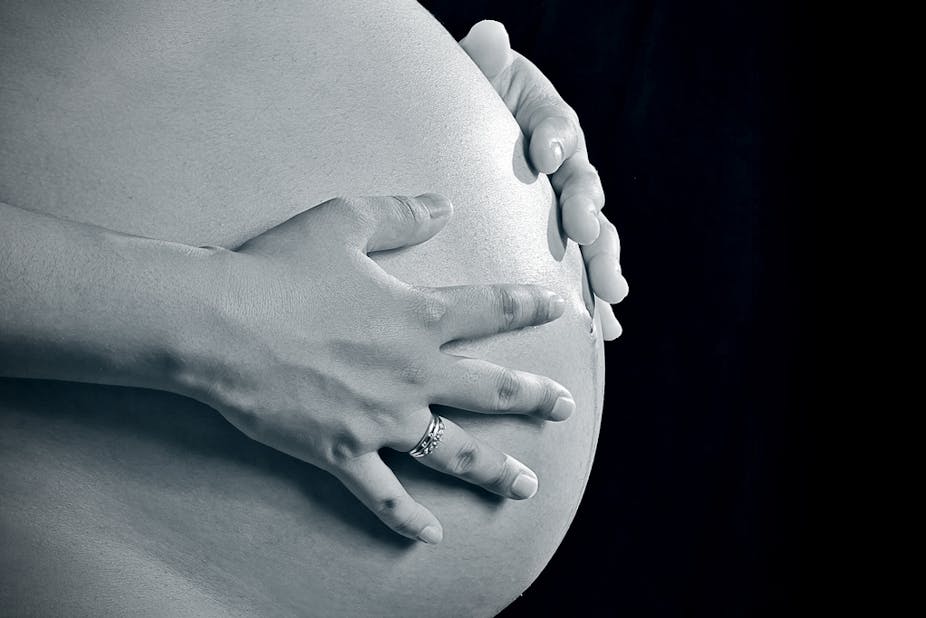Iodine is naturally present in a range of food, especially seaweed and fish. So it may seem odd that the people of an island nation (most of whom live along its vast coastline) are not getting enough of this vital mineral.
Insufficient iodine causes a range of problems including hypothyroidism (which can also be caused by too much of the mineral), high cholesterol, lethargy, fatigue and depression. But its most insidious impact is on brain development, and therefore, on children.
Research recently completed in Adelaide shows that our primary attempt to address iodine shortage (by requiring the use of iodised salt in bread) is failing to provide pregnant women with enough of the mineral.
This is just the latest in a growing body of recent research that should act as a public health wake-up call about our need for adequate iodine, especially during pregnancy, breast-feeding and childhood.
A prospective study from Tasmania has shown that children of mothers with mild iodine deficiency during pregnancy have reduced educational outcomes by the time they are eight or nine (decreased NAPLAN performance of up to 10%).
And a similar study from the United Kingdom, published in the Lancet, has provided convincing evidence that mild maternal iodine deficiency results in decreased IQ in children by the age of eight.
Growth and development
Iodine deficiency is considered by the World Health Organization to be “the single most important preventable cause of brain damage” worldwide.
But Australia’s public health programs have a primary focus on the prevention of excessive weight and obesity in children. They don’t address micronutrient deficiencies and other nutrition issues.
In its most drastic forms, severe iodine deficiency in pregnancy results in cretinism and mental retardation. Studies in China indicate that iodine deficiency results in a population-level loss of intelligence in children up to the magnitude of about 13 IQ points.
Iodine is essential for human growth and development, as the thyroid gland depends on it for the production of hormones. These hormones play an essential role in regulating your metabolism.
Programs to address iodine deficiency were first introduced in Australia in the 1950s. These included the introduction of iodised salt and supplementation through medical practitioners. But they were stopped when communities were considered to be iodine sufficient in the 1980s.
Until the early 1990s, iodine was supplied to Australians mainly via milk through the use of iodised cleaning agents in the dairy industry. But then the cleaning agents changed and iodine deficiency returned.
A national study of schoolchildren published in 2006 identified mild to moderate iodine deficiency in some states. To address this, a mandatory iodisation was started in Australia and New Zealand in late 2009.

All bread-making flour, except organic breads, were to contain iodine. Early reports have shown improvements in children since introduction of fortification. This is good news, but clearly not enough for prospective mothers.
Pregnant and breast-feeding women have iodine needs that are 50% higher than the general population. Our survey of pregnant women three years after iodine was added to bread also found that they would be unable to obtain adequate iodine from their diets, even when it included fortified bread.
A balancing act
Authorities needed to balance the iodine requirements of children with avoiding excess intake across the population before fortifying food with iodine. This dilemma led the National Health and Medical Research Council to recommend iodine supplementation of 150 ug/day for pregnant and breast-feeding women.
But four in ten women are still not taking recommended iodine supplements during their pregnancy. Breast-feeding women are also generally iodine deficient unless they are taking supplements.
Women have been poorly informed about the importance of iodine for development of their baby. Our research shows they perceive the nutritional advice provided by their doctors to be insufficient.
In May 2013, updated clinical guidelines on antenatal care were published by the Department of Health and Ageing. They recommend nutritional supplementation of 150 ug iodine every day throughout pregnancy.
New models of antenatal care will be required to implement these guidelines. Government actions could include: - provision of free nutritional supplements to women during pregnancy, under the Pharmaceutical Benefits Scheme, - improved information about optimal dietary and supplemental iodine intakes for women of reproductive age and - better training of health professionals on the need for adequate iodine intakes.
Iodine deficiency during pregnancy appears to have been overlooked as a preventable cause of developmental delay in young children. Even subtle cognitive changes may affect school attainment, examination grades, and employment opportunities further down the track.
At the population level, a one-point increase in a nation’s average IQ has been associated with a persistent 0.11% annual increase in gross domestic product per capita.
Pregnant and breast-feeding women need to know about the importance of iodine supplements so that their children are not disadvantaged.

